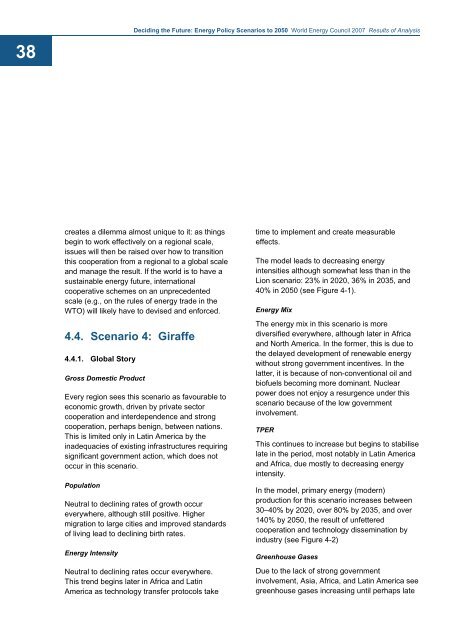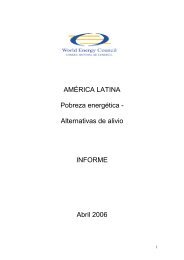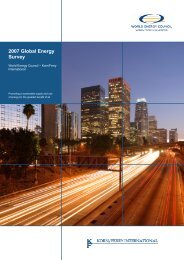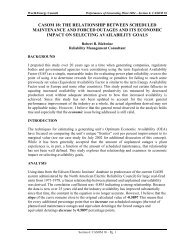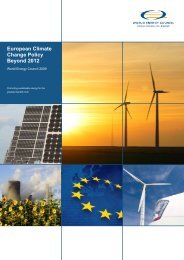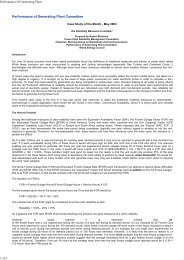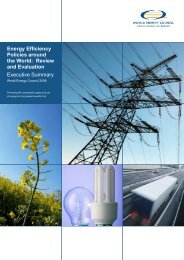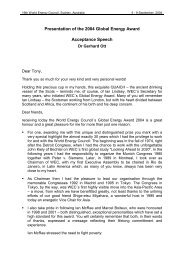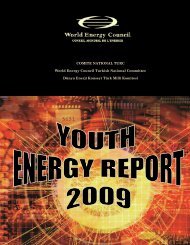Deciding the Future: Energy Policy Scenarios to 2050
Deciding the Future: Energy Policy Scenarios to 2050
Deciding the Future: Energy Policy Scenarios to 2050
Create successful ePaper yourself
Turn your PDF publications into a flip-book with our unique Google optimized e-Paper software.
38<br />
<strong>Deciding</strong> <strong>the</strong> <strong>Future</strong>: <strong>Energy</strong> <strong>Policy</strong> <strong>Scenarios</strong> <strong>to</strong> <strong>2050</strong> World <strong>Energy</strong> Council 2007 Results of Analysis<br />
creates a dilemma almost unique <strong>to</strong> it: as things<br />
begin <strong>to</strong> work effectively on a regional scale,<br />
issues will <strong>the</strong>n be raised over how <strong>to</strong> transition<br />
this cooperation from a regional <strong>to</strong> a global scale<br />
and manage <strong>the</strong> result. If <strong>the</strong> world is <strong>to</strong> have a<br />
sustainable energy future, international<br />
cooperative schemes on an unprecedented<br />
scale (e.g., on <strong>the</strong> rules of energy trade in <strong>the</strong><br />
WTO) will likely have <strong>to</strong> devised and enforced.<br />
4.4. Scenario 4: Giraffe<br />
4.4.1. Global S<strong>to</strong>ry<br />
Gross Domestic Product<br />
Every region sees this scenario as favourable <strong>to</strong><br />
economic growth, driven by private sec<strong>to</strong>r<br />
cooperation and interdependence and strong<br />
cooperation, perhaps benign, between nations.<br />
This is limited only in Latin America by <strong>the</strong><br />
inadequacies of existing infrastructures requiring<br />
significant government action, which does not<br />
occur in this scenario.<br />
Population<br />
Neutral <strong>to</strong> declining rates of growth occur<br />
everywhere, although still positive. Higher<br />
migration <strong>to</strong> large cities and improved standards<br />
of living lead <strong>to</strong> declining birth rates.<br />
<strong>Energy</strong> Intensity<br />
Neutral <strong>to</strong> declining rates occur everywhere.<br />
This trend begins later in Africa and Latin<br />
America as technology transfer pro<strong>to</strong>cols take<br />
time <strong>to</strong> implement and create measurable<br />
effects.<br />
The model leads <strong>to</strong> decreasing energy<br />
intensities although somewhat less than in <strong>the</strong><br />
Lion scenario: 23% in 2020, 36% in 2035, and<br />
40% in <strong>2050</strong> (see Figure 4-1).<br />
<strong>Energy</strong> Mix<br />
The energy mix in this scenario is more<br />
diversified everywhere, although later in Africa<br />
and North America. In <strong>the</strong> former, this is due <strong>to</strong><br />
<strong>the</strong> delayed development of renewable energy<br />
without strong government incentives. In <strong>the</strong><br />
latter, it is because of non-conventional oil and<br />
biofuels becoming more dominant. Nuclear<br />
power does not enjoy a resurgence under this<br />
scenario because of <strong>the</strong> low government<br />
involvement.<br />
TPER<br />
This continues <strong>to</strong> increase but begins <strong>to</strong> stabilise<br />
late in <strong>the</strong> period, most notably in Latin America<br />
and Africa, due mostly <strong>to</strong> decreasing energy<br />
intensity.<br />
In <strong>the</strong> model, primary energy (modern)<br />
production for this scenario increases between<br />
30–40% by 2020, over 80% by 2035, and over<br />
140% by <strong>2050</strong>, <strong>the</strong> result of unfettered<br />
cooperation and technology dissemination by<br />
industry (see Figure 4-2)<br />
Greenhouse Gases<br />
Due <strong>to</strong> <strong>the</strong> lack of strong government<br />
involvement, Asia, Africa, and Latin America see<br />
greenhouse gases increasing until perhaps late


